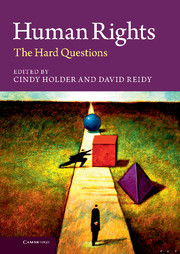Book contents
- Frontmatter
- Contents
- Figure
- List of table
- Notes on contributors
- Introduction
- Part I What are human rights?
- Part II How do human rights relate to group rights and culture?
- Part III What do human rights require of the global economy?
- Part IV How do human rights relate to environmental policy?
- 11 Human rights in a hostile climate
- 12 A human rights approach to energy, poverty and gender inequality
- 13 Pollution wolves in scientific sheep’s clothing
- Part V Is there a human right to democracy?
- Part VI What are the limits of rights enforcement?
- Part VII Are human rights progressive?
- Index
- References
12 - A human rights approach to energy, poverty and gender inequality
Published online by Cambridge University Press: 05 May 2013
- Frontmatter
- Contents
- Figure
- List of table
- Notes on contributors
- Introduction
- Part I What are human rights?
- Part II How do human rights relate to group rights and culture?
- Part III What do human rights require of the global economy?
- Part IV How do human rights relate to environmental policy?
- 11 Human rights in a hostile climate
- 12 A human rights approach to energy, poverty and gender inequality
- 13 Pollution wolves in scientific sheep’s clothing
- Part V Is there a human right to democracy?
- Part VI What are the limits of rights enforcement?
- Part VII Are human rights progressive?
- Index
- References
Summary
Introduction
There are close to three billion people living with little or no access to modern energy sources for household and productive uses. They primarily use traditional biomass fuels from local woodlands and fields – firewood, dung, agricultural residues and charcoal. Recognizing the importance and magnitude of this problem, the UN General Assembly designated 2012 as the International Year of Sustainable Energy for All, and the UN Secretary-General has launched a global initiative on Sustainable Energy for All by 2030.
Is lack of adequate energy a human rights issue? Although the Universal Declaration of Human Rights includes the right to a standard of living that is adequate for health and well-being, energy is not specifically mentioned. Some level of energy access seems to be essential for basic subsistence, including fuel for cooking food and keeping warm. But is there a right to “modern” energy services, such as power for water pumping, agricultural production, food processing, lighting and communications?
In 1986, the UN member states expanded the list of human rights to include a right to development “by virtue of which every human person and all peoples are entitled to participate in, contribute to, and enjoy economic, social, cultural and political development” (United Nations General Assembly 1986 ). Possibly a right to energy would fall within this category, as a necessity for people’s economic and social development.
- Type
- Chapter
- Information
- Human RightsThe Hard Questions, pp. 231 - 245Publisher: Cambridge University PressPrint publication year: 2013
References
- 1
- Cited by

